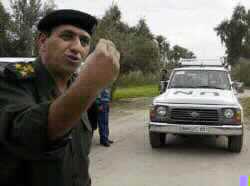- Author:
& News Agencies - Section:
WORLD HEADLINES
- Hajj & Umra WORLD HEADLINES
U.N. weapons experts resume inspections in Iraq

U.N. arms inspectors enforcing a resolution giving Iraq a last chance to disarm or face war examined a military industrial complex and a suspected missile site on Saturday as they resumed work after a one-day break. In a third day of inspections, International Atomic Energy Agency (IAEA) experts spent three hours at the military complex run by the Public Company of the Mother of All Battles in the Yusoufiyyah area some 15 km south of Baghdad.
The company, named after Iraq's term for the 1991 Gulf War over Kuwait, is an arm of the state's Military Industrialisation Commission in charge of developing weapons.
Another group of inspectors from the U.N. Monitoring, Verification and Inspection Commission (UNMOVIC) drove to a suspected anti-aircraft missile and ammunition site at Balad, 75 km north of the capital.
Both groups of experts were accompanied by Iraqi officials.
Iraqi guards barred journalists from entering the large complex south of Baghdad where portraits of President Saddam Hussein stood at the gates.
Later, the guards barred a government four-wheel-drive vehicle from entering the facility while inspectors were inside, in line with a policy of "freeze" on sites under inspection.
The inspectors, who carry out unannounced visits, did not work on Friday, the Muslim holy day. They had visited five sites on their first two days back at work and reported that inspections had gone smoothly.
IRAQ PAPER ATTACKS DEADLINE
Iraq has pledged full cooperation with the inspectors, who returned to Iraq this week after a four-year gap to search for chemical, biological and nuclear arms.
But an Iraqi official newspaper, al-Jumhouriya, denounced on Saturday U.N. demands that Baghdad produce a full account of all its banned weapons programmes by December 8 -- even though Iraq has promised to meet the deadline.
"It is quite clear that this paragraph explicitly accuses Iraq of possessing weapons of mass destruction," a front-page editorial said. "It also casts doubts about Iraq's sincere cooperation with U.N. Security Council resolutions."
The demand is part of Security Council Resolution 1441, passed on November 8, which sets terms for U.N. arms inspections in Iraq and threatens serious consequences for non-compliance.
Earlier this month Iraq vowed to submit a declaration of all its weapons files -- nuclear, chemical, biological and ballistic.
Jumhouriya said the United States had insisted Iraq issue the declaration in order to make things difficult for Baghdad and eventually use it as a cover to "launch its vicious aggression against Iraq".
With the December 8 deadline approaching, Washington announced that one of its top diplomats would visit eight European countries and Turkey next week to consult on Iraq.
Undersecretary of State Marc Grossman will visit NATO offices in Brussels, Britain and Turkey between December 1 and 3 as part of a delegation led by Deputy Defense Secretary Paul Wolfowitz, the State Department said on Friday.
Wolfowitz will return to Washington from Ankara while Grossman, the State Department number three, will travel on to Cyprus, Greece, Germany, the Netherlands, France and Portugal on December 6.
"This trip is part of our ongoing consultations with our allies and partners in Europe and elsewhere on Iraq and efforts to ensure Iraq complies with Security Council Resolution 1441 and other relevant U.N. resolutions," the State Department said.
KURDISH APPEAL
In Paris, Iraqi Kurdish leaders appealed to world leaders to let Iraqi opposition groups piece together a pluralist, democratic government that could replace Saddam's government if he were removed from power.
Addressing a conference on the future of Kurds in Iraq, the two heads of the Kurdish enclave in northern Iraq said they were confident talks next month to hammer out a power-sharing accord between six Iraqi opposition groups could succeed.
"We don't want to see a military ruler ruling Iraq, whether it's an Iraqi dictator or a foreign military ruler. Our goal is to set up a multi-ethnic, pluralist and democratic Iraq," Kurdistan Democratic Party (KDP) head Massoud Barzani said.
Barzani and Patriotic Union of Kurdistan (PUK) head Jalal Talabani said Kurds wanted to be part of a federal Iraq giving them a degree of autonomy and a say in central government.
The opposition groups have lined up some 300 delegates for talks in London on December 13-15, after previous attempts to plan a government were thwarted by squabbling.
In Sydney, Australia, several thousand people marched on Saturday as part of a nationwide protest against any pre-emptive strike on Iraq by the United States and its allies. There were smaller protests in other cities including the capital Canberra.
Australia's government has said it wants a peaceful solution in Iraq, but the recent withdrawal of its troops from the U.S.-led coalition in Afghanistan has sparked speculation they would be shifted to Iraq.
PHOTO CAPTION
An Iraqi official gestures beside a U.N. inspections team vehicle as they leave an animal vaccine production laboratory in Doura, south of Baghdad on November 28. REUTERS/Suhaib Sal
Related Articles
 Hajj virtues
Hajj virtues
-
School of Faith in Ten Days of Thul-Hijjah
The believing human self needs strong provocations in order to awaken whenever it is enveloped by laziness in...
-
The Status of Hajj in Islam
Hajj is the fifth pillar of Islam; Allah, The Exalted, ordained it in the ninth year after Hijrah (the Prophet's,...
-
School of Faith in Ten Days of Thul-Hijjah
The believing human self needs strong provocations in order to awaken whenever it is enveloped by laziness in relation...


 Home
Home Discover Islam
Discover Islam Quran Recitations
Quran Recitations Lectures
Lectures
 Fatwa
Fatwa Articles
Articles Fiqh
Fiqh E-Books
E-Books Boys & Girls
Boys & Girls  Hajj Rulings
Hajj Rulings Hajj Fatwas
Hajj Fatwas












